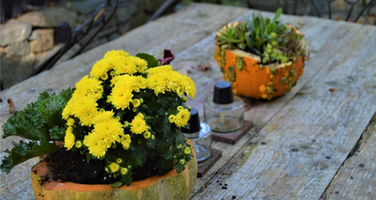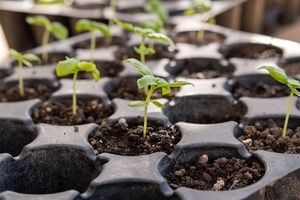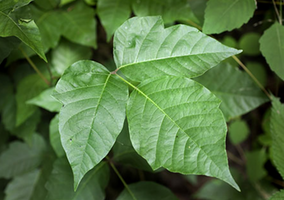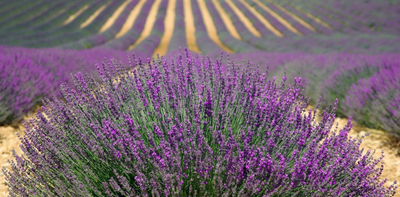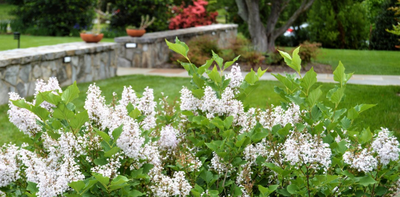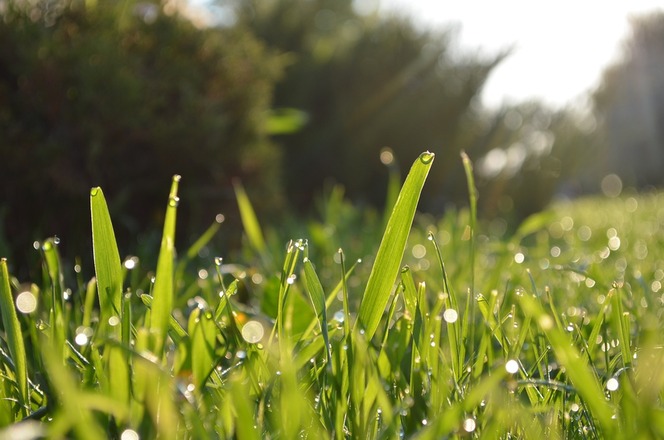
As the temperature rises and the days get longer, it's crucial to give your lawn the attention it deserves. In this comprehensive guide, we will provide you with expert advice on mowing height, proper watering techniques, grub control, dog waste cleanup, parking precautions, mower blade maintenance, and the benefits of letting clippings lie. By following these top tips, you'll be well-equipped to keep your lawn vibrant, green, and thriving throughout the summer season. Let's dive in!
Mow at the Right Height
During the summer months, adjusting your mower height to leave the grass taller is crucial for maintaining a healthy and vibrant lawn. Here's why:
- Longer Grass Protects Against Heat Stress: Taller grass provides shade to the soil, keeping it cooler and reducing the risk of heat stress. This is especially important during scorching summer days when the sun's intense rays can damage the grass.
- Promotes Strong Root Growth: By mowing at a higher height, you encourage the development of deeper and stronger root systems. This allows the grass to access water and nutrients from deeper in the soil, making it more resilient against drought conditions.
- Suppresses Weed Growth: Longer grass blades shade the soil, making it more challenging for weeds to germinate and grow. By mowing at the right height, you can naturally control weed growth and reduce the need for chemical herbicides.
- Enhances Aesthetic Appeal: Taller grass tends to have a lusher, fuller appearance, giving your lawn a more manicured and inviting look. It creates a carpet-like effect, adding texture and depth to the overall landscape.
 To achieve the ideal mowing height, adjust your mower's cutting deck to leave the grass around 3 to 3.5 inches tall. However, make sure not to remove more than one-third of the grass blade's length at a time to avoid stressing the plant. Regular mowing at the right height will keep your lawn looking its best throughout the summer season.
To achieve the ideal mowing height, adjust your mower's cutting deck to leave the grass around 3 to 3.5 inches tall. However, make sure not to remove more than one-third of the grass blade's length at a time to avoid stressing the plant. Regular mowing at the right height will keep your lawn looking its best throughout the summer season.
Water Properly
Proper watering is vital for maintaining a healthy lawn during the summer. Here are some tips to ensure your lawn gets the water it needs:
- Water Deeply and Infrequently: Instead of light daily watering, give your lawn a deep soak once or twice a week. This encourages the roots to grow deeper, making them more resilient to heat and drought. Aim for about one inch of water per week, including rainfall.
- Water in the Morning: Watering your lawn in the early morning allows the grass blades to dry before evening, reducing the risk of diseases caused by prolonged moisture. It also ensures that the water has time to penetrate the soil and reach the roots before the heat of the day.
- Use Proper Irrigation Techniques: Avoid overhead sprinklers that can waste water through evaporation and promote fungal diseases. Consider using a soaker hose or a drip irrigation system to deliver water directly to the roots where it's needed most.
- Observe Signs of Water Stress: Keep an eye out for signs of dehydration, such as grass blades turning a bluish-gray color or footprints remaining visible after walking on the lawn. These are indications that your lawn needs watering.
Remember, every lawn is unique, so factors like soil type, grass species, and local climate should be considered when determining the optimal watering schedule. By following these watering guidelines, you'll help your lawn thrive even in the hottest summer months.
Treat for Grubs
Grubs, the larvae of beetles, can wreak havoc on your lawn if left untreated. Here's why treating for grubs is essential during the summer:
- Prevents Lawn Damage: Grubs feed on grassroots, causing your lawn to become weak, brown, and easily uprooted. By treating for grubs, you can prevent widespread lawn damage and maintain a healthy turf.
- Breaks the Life Cycle: Treating for grubs disrupts their life cycle, preventing them from maturing into adult beetles and laying eggs for the next generation. This helps control their population and reduces the risk of future infestations.
- Timing is Key: Applying grub control products in early summer is crucial because this is when the grubs are small and most susceptible to treatment. Waiting until later in the season may result in larger, harder-to-eradicate grubs.
- Choose the Right Treatment: There are various grub control products available, including chemical and biological options. Consult with a lawn care professional or garden center to determine the most suitable treatment for your specific situation.
Remember to always follow the instructions on the product label when applying grub control treatments. Regular monitoring and early intervention are key to keeping your lawn grub-free and thriving throughout the summer.
Clean Up After Your Pooch
If you have a furry friend, it's essential to clean up after them to maintain a healthy and aesthetically pleasing lawn. Here's why it's important:
- Protects Your Lawn's Health: Dog waste contains harmful bacteria and nitrogen, which can damage the grass and contribute to the formation of brown spots. Regularly removing dog waste helps minimize these risks and keeps your lawn healthy.
- Eliminates Unpleasant Odors: Let's face it, dog waste can create unpleasant odors that linger in your outdoor space. By promptly cleaning up after your pooch, you can prevent these odors from permeating your yard and outdoor living areas.
- Maintains a Clean and Safe Environment: Dog waste left on the lawn can attract flies and other pests, creating an unsanitary environment for your family and pets. It's crucial to remove the waste to maintain a clean and safe outdoor space.
- Shows Consideration for Others: Cleaning up after your dog is not only responsible pet ownership but also a considerate act towards your neighbors and community. It helps ensure that everyone can enjoy a clean and well-maintained neighborhood.
Always use a poop bag or scooper to pick up dog waste and dispose of it properly. Avoid using plastic bags that are not biodegradable, as they contribute to environmental pollution. By being diligent with cleaning up after your pooch, you'll keep your lawn fresh, healthy, and enjoyable for everyone.
Avoid Parking on the Grass
Parking vehicles on the grass can cause significant damage to your lawn, especially during the summer months. Here's why it's crucial to avoid parking on the grass:
- Soil Compaction: The weight of vehicles compresses the soil, reducing its ability to absorb water and nutrients. This can lead to poor drainage, root suffocation, and weakened grass growth.
- Rutting and Tire Tracks: Parking on the grass can create unsightly ruts and tire tracks, which are not only aesthetically displeasing but also difficult to repair. These marks can disrupt the evenness of your lawn and require extra effort to restore.
- Increased Weed Growth: Compacted soil and damaged grass create ideal conditions for weed growth. Weeds can quickly invade the areas where the grass has been weakened, leading to further lawn maintenance issues.
- Limiting Sunlight and Airflow: Vehicles parked on the grass block sunlight and restrict airflow, creating conditions that are favorable for fungal diseases. These diseases can cause patches of dead or yellowing grass, requiring additional treatments to restore the lawn's health.
To protect your lawn, designate proper parking areas, such as driveways or designated parking spaces. If you don't have an alternative parking solution, consider installing a gravel or concrete pad where vehicles can be parked without damaging the grass. By avoiding parking on the grass, you'll preserve the health and beauty of your lawn throughout the summer season.
Sharpen Your Mower Blade
A sharp mower blade is essential for maintaining a healthy lawn during the summer. Here's why you should regularly sharpen your mower blade:
- Clean and Precise Cuts: A sharp mower blade cuts through grass cleanly, resulting in a smooth and even finish. Dull blades, on the other hand, tear and shred the grass, leaving behind ragged edges that not only look unsightly but also make the grass more susceptible to diseases and pests.
- Promotes Faster Recovery: Dull blades can cause grass blades to fray, leading to increased moisture loss and stress. By using a sharp blade, you minimize damage, allowing the grass to recover quickly and maintain its overall health and resilience.
- Reduces Stress on the Mower: Dull blades require more power to cut through the grass, putting additional strain on the mower's engine. Regularly sharpening the blade reduces wear and tear on the mower, extending its lifespan and improving its overall performance.
- Saves Time and Energy: A sharp blade cuts through grass more efficiently, reducing the need for multiple passes and saving you time and energy. This is especially important during the summer when the grass tends to grow faster and requires more frequent mowing.
To sharpen your mower blade, remove it from the mower and use a file or a grinder to sharpen the cutting edge. If you're not confident in your sharpening skills, take the blade to a professional for maintenance. By keeping your mower blade sharp, you'll achieve a healthier, more visually appealing lawn all summer long.
Let Clippings Lie
Contrary to popular belief, leaving grass clippings on the lawn can actually benefit its health. Here's why you should let the clippings lie:
- Natural Fertilizer: Grass clippings are rich in nutrients, including nitrogen, phosphorus, and potassium. These nutrients can serve as a natural fertilizer, returning valuable organic matter to the soil.
- Moisture Retention: The layer of grass clippings acts as a natural mulch, helping to retain moisture in the soil. This is especially beneficial during hot summer months when water evaporation is high.
- Reduced Fertilizer Needs: By allowing the clippings to decompose on the lawn, you can reduce the amount of synthetic fertilizers needed. This not only saves you money but also promotes a more environmentally friendly approach to lawn care.
- Enhanced Soil Health: As the grass clippings decompose, they contribute to the overall health of the soil by improving its structure, increasing microbial activity, and enhancing nutrient availability.
To effectively let the clippings lie, ensure that you're mowing at the recommended height and not removing more than one-third of the grass blade's length at a time. This ensures that the clippings are small enough to decompose quickly without smothering the grass.
By implementing the top tips outlined in this guide, you can ensure that your lawn remains lush and healthy during the summer months. Remember to adjust your mowing height, water your lawn properly, address grub control issues, clean up dog waste diligently, take precautions when parking, maintain your mower blades, and let the clippings lie. With consistent care and attention, your yard will become the envy of the neighborhood. So get out there, enjoy the sunshine, and create a beautiful outdoor space that you can be proud of. Happy summer lawn care!
Other Blog Posts You May Be Interested In:
Summer Maintenance Tips for Successful Vegetable Gardening

About RightPlantz - RightPlantz is your go-to source for all things gardening. RightPlantz grows better gardeners.


